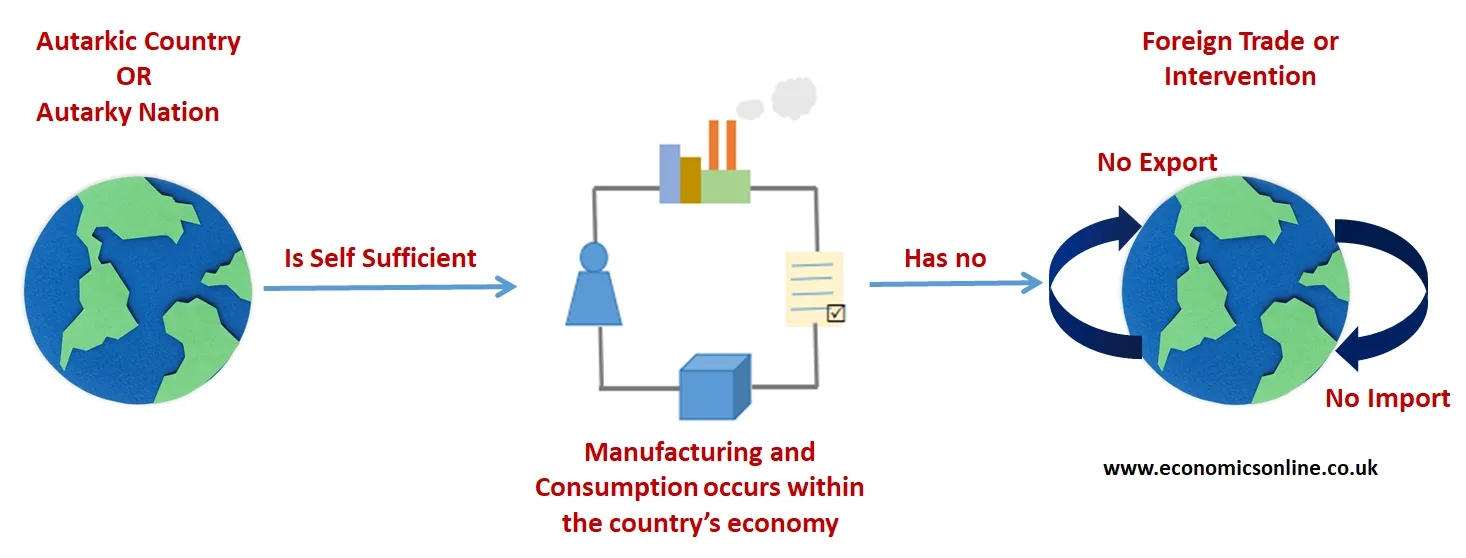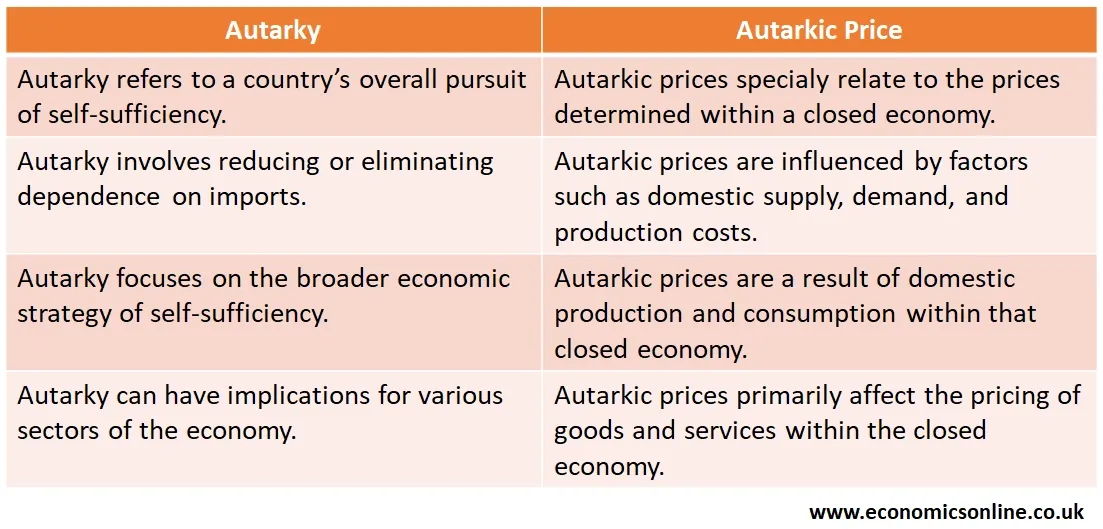
An image of a yellow building with windows.
Autarkic: A Comprehensive Guide
Definition
Autarkic refers to the policy of a country to be a self-sufficient, closed economy without any external trade.
In simple words, autarkic means the use of self-sufficiency policies or conditions in which a country aims to rely on its own resources rather than on outside or foreign resources. The policy of autarky aims to minimise dependence on external resources and maximise internal efficiencies.
Explanation
If a country implements an autarkic policy, this means that they should have to produce all the domestic needs of their country, like food, clothing, medicine, machinery, and other things, on their own rather than depending on foreign exports. It involves the use of strict trade rules and regulations to minimise international trade in the form of imports and exports. In this way, they should invest more in domestic production to fulfil the needs of the people of the country.
An autarkic nation aims to do everything on its own instead of relying on external resources to create a self-sufficient domestic economy.
During the 1960s, international trade contributed only 10% to the U.S. GDP, a percentage that was relatively close to the tightly autarkic nations like the Soviet Union (4%) and China (5%). Due to insignificant percentage of international trade, these countries can be considered as close examples of autarkic nations.
19th-century Japan was also an example of an autarkic country or nation. An extensive form of autarky was used by Nazi Germany where Hitler tried to make the country self-sufficient. Another good example of autarky is North Korea.
Diagram
The following diagram illustrates an autarkic country or nation that is self-sufficient and relies on its own resources rather than depending on international trade.

History of Autarky
A brief historical description of autarky is as follows:
Origin of Autarky
Autarky originates from a Greek word autárkeia which was used to explain the self-sufficiency and independence of a country. Plato and Aristotle explained the concept of autarky throughout history as a mean to achieve economic goals.
Ancient and Mediaeval
During this time period, the autarky was a basic necessity for the countries because, at that time, trade was limited due to limited technological advancements. Communities and civilizations prefer to produce domestic goods within their own boundaries, relying on their own agricultural resources.
19th and Early 20th Centuries
During the 19th and early 20th centuries, the industrialisation and other communities inside a country engaged in activities that increased foreign trade and interdependence. But still, some countries implement autarkic policies to protect domestic industries from external entities and reduce their dependence on foreign goods.
After World War II
But after the destruction of World War II, the countries moved away from the autarkic policies. The countries accepted the importance of economic cooperation and increased trade with each other. They established the World Trade Organisation (WTO), which promotes free trade (free flow of goods and services) and reduces barriers.
Contemporary Economies
The major opponents of autarky were Adam Smith (the father of modern economics) and David Ricardo. Adam Smith (the 18th century economist) questioned the benefits of using autarkic policies and used the concept of absolute advantage for achieving economic goals. David Ricardo, forwarded the concept of gains through specialisation and international trade by using comparative advantage. In the contemporary era, many countries support globalisation and interconnectedness, with excessive supply chains and trade networks. But some countries still prioritise some sectors for self-sufficiency, where each country specialises in what it does best and trades with others for the rest.
The models used in a modern economy give less weight to autraky and more weight to globalisation and international trade.
Types of Autarky
On the basis of self-sufficiency, autarky is classified into three types, which are as follows:
Partial Autarky
In partial autarky, the country is self-sufficient only in some sectors or industries but still engages in international trade for necessary domestic goods.
Complete Autarky
In complete autarky, the country completely relies on a policy of self-sufficiency and is totally independent in production, consumption, and use of resources. In complete autarky, there are restrictions on international trade in autarkic countries.
Regional Autarky
In regional autarky, small groups of countries within a specific region aim to be independent rather than relying on external entities.
Advantages of Autarky
The advantages of autarky are as follows:
Self-sufficiency
Self-sufficiency is a major advantage of autarky because it allows countries to rely on their own resources rather than depending on external sources to fulfil their needs. It also reduced international trade, providing independence to autarkic countries.
Protection of Domestic Industries
Protection of domestic industries is also a motivation behind using autarky, as it protects countries from international competition. Autarkic countries implement strict trade barriers to support small businesses.
National Security
National security is a major advantage of autarky because, when a country is self-sufficient, it reduces its vulnerability to external shocks, disruptions in global supply chains, or political clashes with foreign countries.
Economic Stability
Economic stability is an advantage of autarky because autarky provides stability to economic instability in countries. It reduces the inefficiencies and fluctuations in global market conditions and exchange rates for trade.
Development of Domestic Capabilities
Another advantage of autarky is the development of domestic capabilities. Autarkic countries encourage the development of domestic industries producing necessary goods and also stimulates the innovation of new products, technological advancements. Autarky also promotes small businesses to grow.
Limitations of Autarky
The limitations of autarky are as follows:
Limited Variety
Limited variety is a limitation of autarky in which relying solely on domestic resources hinders or restricts the access of consumers to a wide range of products or services available in the global marketplace, hence providing a limited variety of goods to the consumers of that country.
Higher Costs
Higher costs are also a limitation of autarky in which a lack of competition and economies of scale leads to a situation where the prices of every product are high due to autarkic policy. Without benefiting from our own products or services or accessing cheaper products from foreign countries, the costs of products are high relative to others.
Inefficiency
Inefficiency is also a limitation of autarky in which resources are not allocated efficiently because there is no competition or economies of scale that drives optimisation. That is why resources are used inefficiently and the productivity of a country decreases.
Lack of Comparative Advantage
Lack of comparative advantage is a limitation of autarky, which explains that countries should specialise in the production of domestic goods or services in which they have low opportunity costs to spend on the production process. Autarky disrespects the concept of comparative advantage. Hence, the lack of comparative advantages leads to decreased economic growth and domestic infrastructure.
Vulnerability to External Shocks
It is also a limitation of autarky because when a country isolates itself from the global market, its economies become vulnerable to external shocks. These autarkic countries struggle to adapt to changes in technologies and supply and demand, which have a worse impact on their economic growth.
Autarky and Autarkic Price
The following table compares the major points between autarky policy and autarky price.

Conclusion
In conclusion, autarky is a concept in economics in which countries aim to achieve self-sufficiency by reducing their dependence on international trade or external entities. These countries rely on their own resources for production and consumption to meet their domestic needs. Autarky has both advantages and disadvantages and is an important concept for understanding the independence of countries in the global market. The opponents argue that it is impossible to satisfy many human needs through domestic production and autarkic policies.


